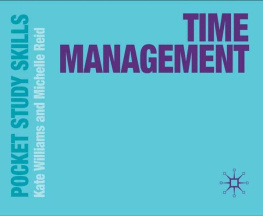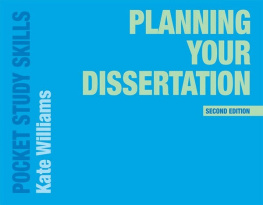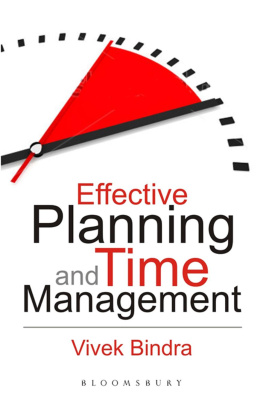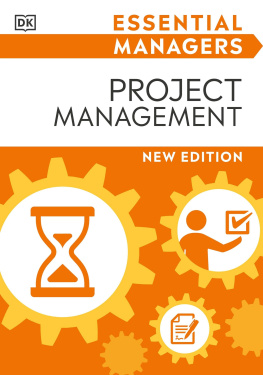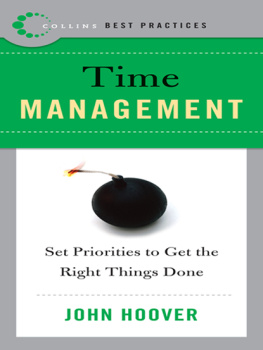TIME MANAGEMENT
POCKET STUDY SKILLS
Series Editor: Kate Williams, Oxford Brookes University, UK Illustrations by Sallie Godwin
For the time-pushed student, the Pocket Study Skills pack a lot of advice into a little book. Each guide focuses on a single crucial aspect of study, giving you step-by-step guidance, handy tips and clear advice on how to approach the important areas which will continually be at the core of your studies.
Published
14 Days to Exam Success
Blogs, Wikis, Podcasts and More
Brilliant Writing Tips for Students
Completing Your PhD
Doing Research
Getting Critical
Planning Your Essay
Planning Your PhD
Reading and Making Notes
Referencing and Understanding Plagiarism
Science Study Skills
Success in Groupwork
Time Management
Writing for University
Further titles in preparation
Pocket Study Skills
Series Standing Order
ISBN 978-0230-21605-1
(outside North America only)
You can receive future titles in this series as they are published by placing a standing order. Please contact your bookseller or, in case of difficulty, write to us at the address below with your name and address, the title of the series and the ISBN quoted above.
Customer Services Department, Macmillan Distribution Ltd Houndmills, Basingstoke, Hampshire RG21 6XS England
TIME MANAGEMENT
POCKET STUDY SKILLS
Kate Williams & Michelle Reid


Kate Williams and Michelle Reid 2011
All rights reserved. No reproduction, copy or transmission of this publication may be made without written permission.
No portion of this publication may be reproduced, copied or transmitted save with written permission or in accordance with the provisions of the Copyright, Designs and Patents Act 1988, or under the terms of any licence permitting limited copying issued by the Copyright Licensing Agency, Saffron House, 6-10 Kirby Street, London EC1N 8TS.
Any person who does any unauthorized act in relation to this publication may be liable to criminal prosecution and civil claims for damages. The authors have asserted their right to be identified as the authors of this work in accordance with the Copyright, Designs and Patents Act 1988.
First published 2011 by
PALGRAVE MACMILLAN
Palgrave Macmillan in the UK is an imprint of Macmillan Publishers Limited, registered in England, company number 785998, of Houndmills, Basingstoke, Hampshire RG21 6XS.
Palgrave Macmillan in the US is a division of St Martins Press LLC, 175 Fifth Avenue, New York, NY 10010.
Palgrave Macmillan is the global academic imprint of the above companies and has companies and representatives throughout the world.
Palgrave and Macmillan are registered trademarks in the United States, the United Kingdom, Europe and other countries
ISBN-13: 978-0-230-29960-3
This book is printed on paper suitable for recycling and made from fully managed and sustained forest sources. Logging, pulping and manufacturing processes are expected to conform to the environmental regulations of the country of origin.
A catalogue record for this book is available from the British Library.
A catalog record for this book is available from the Library of Congress.
10 9 8 7 6 5 4 3 2 1
20 19 18 17 16 15 14 13 12 11
Printed in China
Acknowledgements
Many people have contributed to this book and we would like to thank them all. The experiences of the students we have worked with form the bedrock of this book, and many of their comments are quoted directly in the margins. These give an insight into both the pressures students work under and the inventiveness of the solutions and strategies students have developed. We pass them on to you
We have also drawn on the experiences of staff in several countries both in the text and in the comments we capture in the margins. Many thanks to all who contributed their thoughts at various points in the process from inception to critical review:
Marion Casey, Counsellor, Oxford Brookes University, UK
Susan Christopherson, J. Thomas Clark Professor, City and Regional Planning, Cornell University, USA
Gordon Clark (FBA), Halford Mackinder Professor of Geography, University of Oxford, UK for sharing his insights into the time pressures shared by students in the USA, UK and Australia
Betsy Donald, Associate Professor, Department of Geography, Queens University, Ontario, Canada
Phillip ONeill, Director, Urban Research Centre, University of Western Sydney, Australia
Jim Pye, Mature Students Adviser, Oxford Brookes University, UK
Kim Shahabudin, Study Adviser, University of Reading, UK
Michael Webber, Professorial Fellow, Department of Resource Management and Geography, The University of Melbourne, Australia
Our thanks too to Sallie Godwin for her astute illustrations, and to Suzannah Burywood and colleagues in the editing and production teams at Palgrave Macmillan who have been endlessly supportive and creative in making this book happen.
Introduction
Your time at university is a time of change. It is a particular phase of your life that you have chosen and you want to make the most of it. It is a time of opportunity, to learn, to meet people and experience new ideas and ways of doing things and to become in some way a different person at the end of it.
It can also be a pressurised time, where the core business of the university the modules and courses you take run to a particular schedule with fixed deadlines and expectations about how you fit into this established pattern. This may come naturally to you, or it may feel stressful, at least to begin with.

But no one is born good or bad at managing their time! The strategies we all employ to do (or avoid doing) something are habits we have developed over the years not fixed characteristics.
Time management in this book is not about what you should be doing and rigid timetables that you will never stick to. It is about finding effective ways of getting things done, putting you in control of your time and making a few small changes to achieve what you want to achieve during your time at university.
About this book
Getting it all done suggests some core strategies for getting it all done in the time you have.
Getting strategic about time is about taking control, getting informed and finding all the key information you need about your term or semester.
Planning the term or semester shows how you can use that information to plan the shape of your term or semester.
Troubleshooting Different people have different issues when it comes to time management. Dip in and out for suggestions depending on what you need.
What next ? invites you to review how you used your time in the semester just gone, and to think about any changes you might make in the future.
starts with whats in front of you how to start organising your current tasks, files and workspace. It moves on to looking at the shape of your week and where you can maximise your time and priorities. It ends with broader reflections on how you can make the most of your time at university.
Next page
